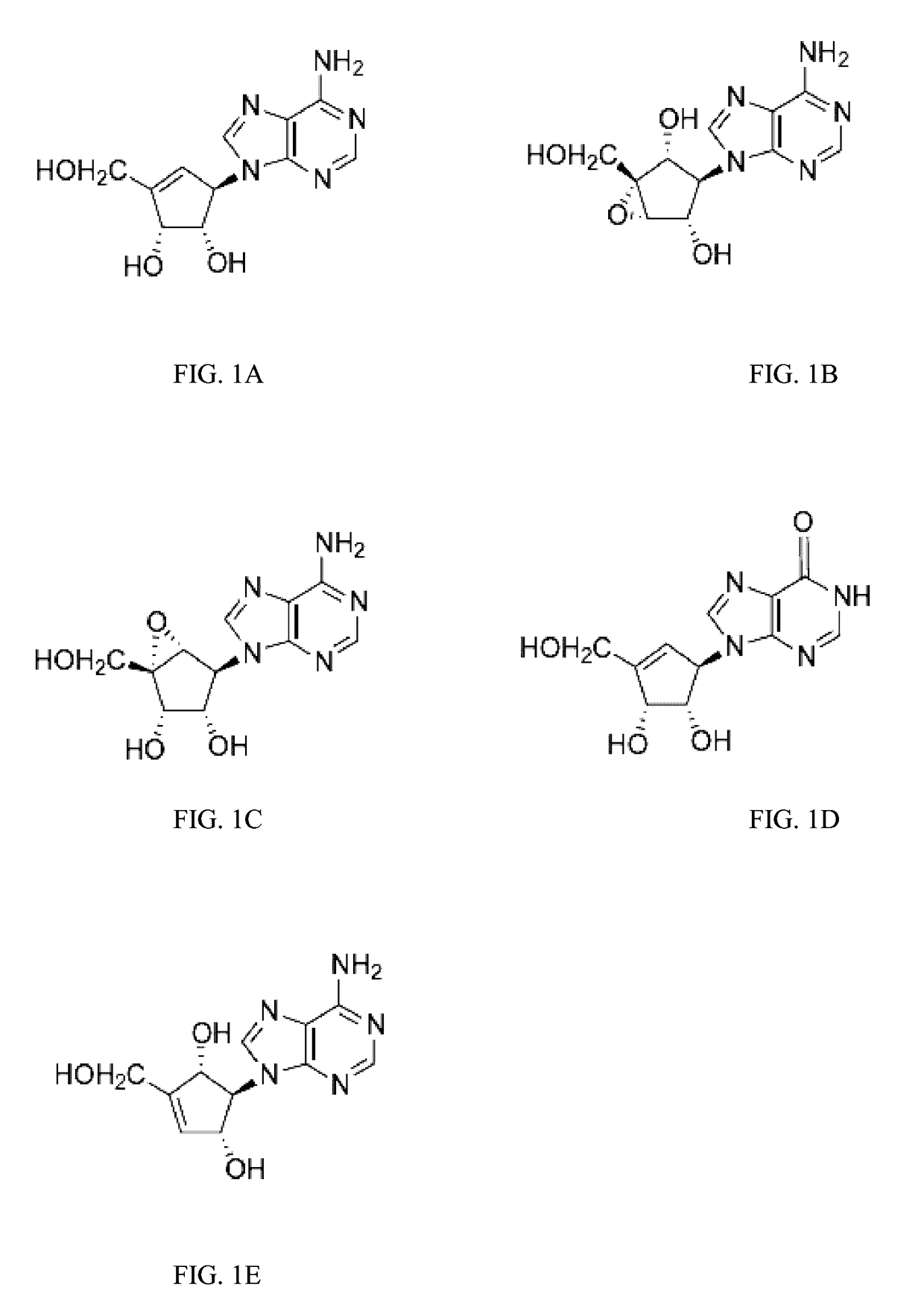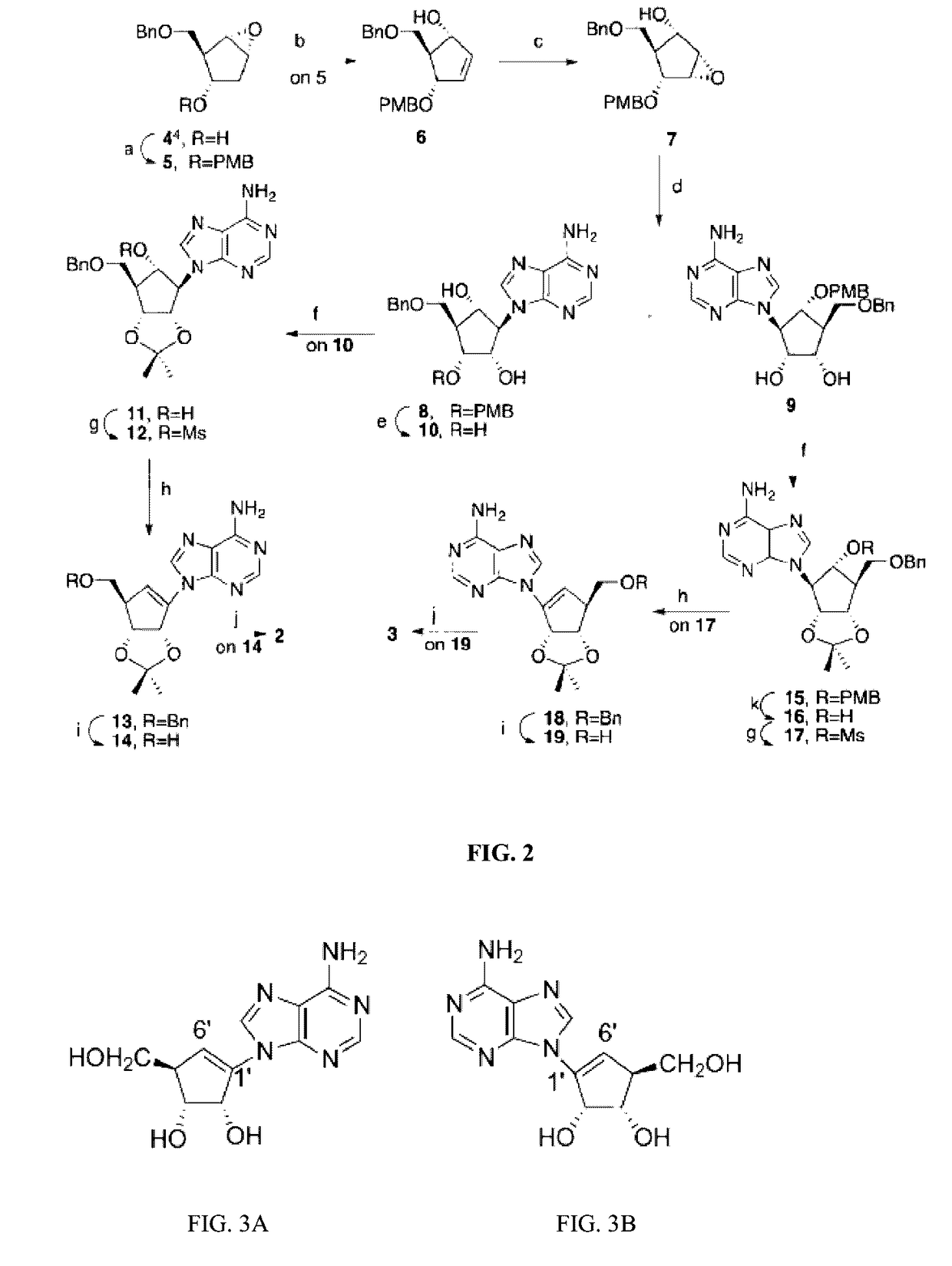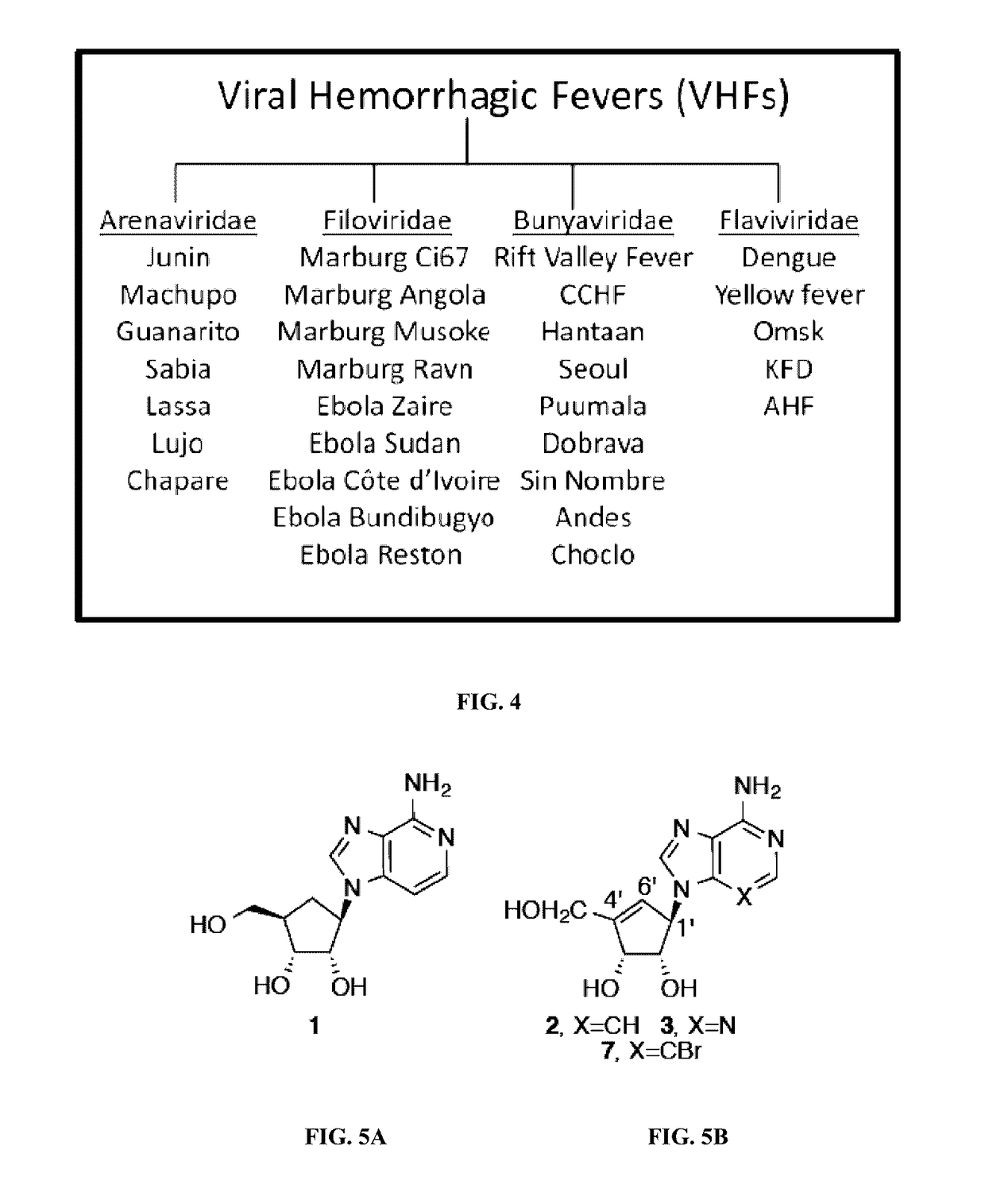Enantiomers of the 1′,6′-isomer of neplanocin A
a technology of neplanocin and enantiomers, which is applied in the field of enantiomers of 1′, 6′ isoneplanocin, can solve the problems of high mortality rate, high contagious hemorrhagic fever virus, and vhf virus, and achieve the effects of improving, inhibiting, and improving viral infection
- Summary
- Abstract
- Description
- Claims
- Application Information
AI Technical Summary
Benefits of technology
Problems solved by technology
Method used
Image
Examples
example 1
Synthesis of D-Isoneplanocin.
Step 1: Synthesis of (1S,2R,3S,5R)-2-((Benzyloxy)methyl)-3-((4-methoxybenzyl)oxy)-6-oxabicyclo[3.1.0]-hexane 5
[0143]A solution of cyclopentyl epoxide 4 (See Ludek & Meier, Synthesis 2003, 13, 2101; Biggadkike et al., J. Chem. Soc., Perkin Trans, 1 1998, 549) (1.12 g, 5.08 mmol) in THF (20 mL) was treated with NaH (60%, 224 mg, 6.10 mmol) at 0° C. The reaction mixture was allowed to stir at room temperature for an additional 30 min. and 4-methoxylbenzyl bromide (0.72 mL, 5.59 mmol) and tetrabutylammonium iodide (20 mg, 0.05 mmol) were added. After 24 h, the reaction mixture was quenched with saturated NH4Cl solution and extracted with EtOAc. The organic layer was dried (Na2SO4), filtered and the solvent was removed by rotary evaporation. The pure product (1.65 g, 95%) was isolated using column chromatography (2:1, hexanes / EtOAc) as a clear liquid: 1H NMR (400 MHz, CDCl3) d ppm 7.30-7.24 (m, 5H), 7.20 (d, J=8.8 Hz, 2H), 6.81 (d, J=8.8 Hz, 2H), 4.46 (s, 2H)...
example 2
Synthesis of L-Isoneplanocin.
Steps 1-3: The procedure outlined in Example 1, steps 1-3 for the preparation of (1S,2S,3S,4R,5R)-3-(Benzyloxy)methyl)-4-((4-methoxybenzyl)oxy)-6-oxabicyclo[3.1.0]hexan-2-ol 7.
Step 4: Synthesis of (1S,2R,3R,4R,5S)-3-(6-Amino-9H-purin-9-yl)-5-((benzyloxy)methyl)-4-((4-methoxybenzyl)oxy)cyclopentane-1,2-diol 9
[0154]Adenine (1.23 g, 9.1 mmol) and (1S,2S,3S,4R,5R)-3-(Benzyloxy)methyl)-4-((4-methoxybenzyl)oxy)-6-oxabicyclo[3.1.0]hexan-2-ol (1.30 g, 3.65 mmol) were suspended in DMF (20 mL) under N2 for 15 min. at room temperature. 1,8-Diazabicyclo[5.4.0]undec-7-ene (DBU, 1.64 mL, 10.9 mmol) was added and the reaction mixture was heated at 90° C. for 8 h. After the reaction was cooled to room temperature, the resulting solid was removed by filtration over Celite and then rinsed with CH2Cl2. The filtrate was evaporated under reduced pressure and the residue purified by column chromatography to afford 9 (550 mg, 31%) as white foam (10:1, CH2Cl2 / MeOH, respectively...
example 3
Antiviral Activities of “D”-Isoneplanocin and “L”-Isoneplanocin
[0162]“D”-Isoneplanocin and “L”-Isoneplanocin synthesized in examples 1 and 2, respectively, were evaluated against both DNA and RNA viruses to address their efficacy in reducing viral replication. The compound concentration resulting in 50% reduction in viral replication (EC50), the compound concentration reducing cell viability by 50% (CC50) and the selectivity index (SI50 : CC50 / EC50) are shown in Table 1.
[0163]The antiviral assays were based on inhibition of virus-induced cytopathicity in either 2.2.15 (HBV), HFF (Vaccinia, HCMV), HG23 (NOV), or Vero (Dengue, Measles, Ebola) cell cultures, following previously established procedures (Chen et al, Bio. & Med. Chem. 2014, 22, 6961-6964, including description of assay methods in references 12(a)-(i), which are herein incorporated by reference its its entirety). Confluent cell cultures in 36-well microtitre plates were inoculated with 100 CCID50 of virus, 1 CCID50 being t...
PUM
| Property | Measurement | Unit |
|---|---|---|
| body weight | aaaaa | aaaaa |
| temperature | aaaaa | aaaaa |
| temperature | aaaaa | aaaaa |
Abstract
Description
Claims
Application Information
 Login to View More
Login to View More - R&D
- Intellectual Property
- Life Sciences
- Materials
- Tech Scout
- Unparalleled Data Quality
- Higher Quality Content
- 60% Fewer Hallucinations
Browse by: Latest US Patents, China's latest patents, Technical Efficacy Thesaurus, Application Domain, Technology Topic, Popular Technical Reports.
© 2025 PatSnap. All rights reserved.Legal|Privacy policy|Modern Slavery Act Transparency Statement|Sitemap|About US| Contact US: help@patsnap.com



